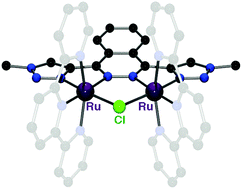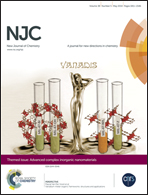Dinuclear ruthenium complexes containing a new ditopic phthalazin-bis(triazole) ligand that promotes metal–metal interactions†
Abstract
Much attention has been paid to heterocyclic N-containing ligands due to their applicability as bridging ligands in the synthesis of redox active dinuclear metal complexes. With this aim, we report the synthesis and full characterization of a novel phthalazine-triazole ligand (1,4-bis(1-methyl-1H-1,2,3-triazol-4-yl)phthalazine). Moreover, we show that the phthalazine nitrogen atoms of this N-heterocyclic ligand are more reactive towards alkylating agents than the triazole groups. New ruthenium(II) complexes containing this ligand have been obtained and characterized both structurally and electrochemically. The geometry imposed by the ligand allows the placement of two ruthenium centers in very close proximity so that efficient through-space interactions take place, a concept of crucial importance for electron transfer processes.

- This article is part of the themed collection: Advanced Complex Inorganic Nanomaterials

 Please wait while we load your content...
Please wait while we load your content...